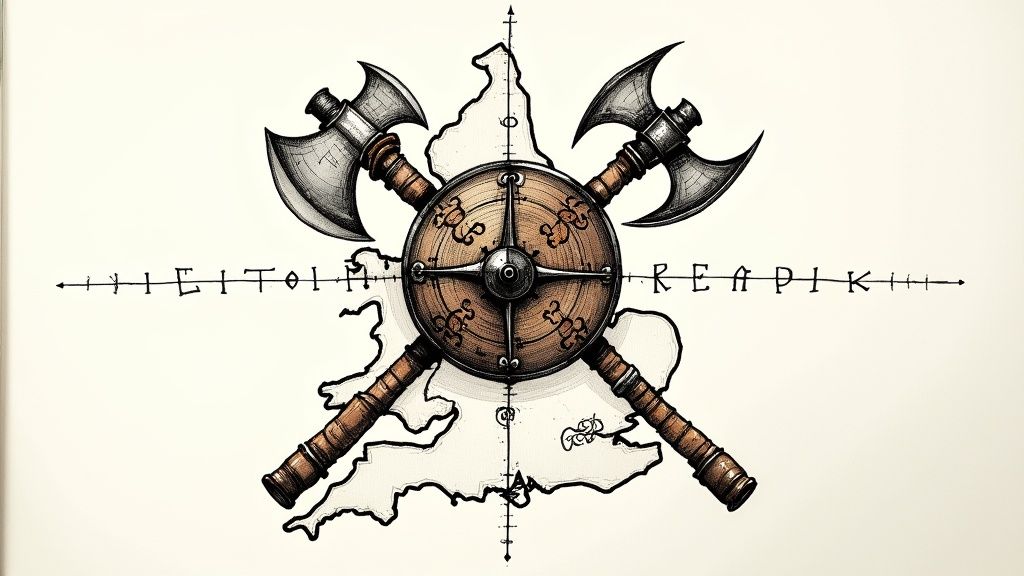Bernard Cornwell’s The Saxon Stories, widely known as The Last Kingdom series, is a masterclass in historical fiction, thrusting readers into the brutal, shield-splintering world of 9th and 10th-century Britain. The saga follows the life of the indomitable Uhtred of Bebbanburg, a Saxon lord raised by Danes, chronicling the birth of England amidst a storm of Viking invasions and political turmoil.
For new readers and seasoned fans alike, tackling this epic 13-book saga can feel as daunting as facing a Danish shield wall. This guide provides the definitive answer to ensure you experience the Saxon series in order. We present the complete list by publication date, which also follows the story’s chronological progression. Each entry will break down the book's core conflict and its place in Uhtred’s legendary journey from dispossessed lord to legendary warrior. Prepare your axe and find your place on the bench; the saga awaits.
1. The Last Kingdom (2004)
The essential starting point for the Saxon series in order, The Last Kingdom introduces the saga's iconic protagonist, Uhtred of Bebbanburg. Born a Saxon nobleman in 9th century Northumbria, Uhtred is captured and raised by Danish Vikings after his father is slain in battle. The novel, set from 866 AD, masterfully establishes his central conflict: a man torn between the Saxon world of his birthright and the Danish culture that shaped him. This foundational book sets Uhtred on a lifelong quest to reclaim his ancestral fortress, Bebbanburg, amidst the Viking invasions that threaten to extinguish the English kingdoms.

This novel's success laid the groundwork for the entire series, eventually leading to its popular adaptation as the BBC and Netflix television show of the same name. Its blend of historical accuracy and compelling character drama has also made it a favorite in educational settings and book clubs focused on historical fiction.
Key Takeaways for New Readers
To fully immerse yourself in Uhtred's world, it is crucial to begin your journey here. Starting with The Last Kingdom ensures you understand the origins of Uhtred’s motivations, his complex relationships, and the historical context that drives the entire narrative.
Geographical Context: Keep a map of 9th century England handy to track Uhtred's travels and the shifting allegiances between kingdoms like Wessex, Mercia, and Northumbria.
Audiobook Experience: Consider the audiobook version for an immersive experience, as the narration often provides authentic pronunciation for the Old Norse and Anglo-Saxon names and places.
Character Foundation: This book establishes the core cast and their initial dynamics. For a deeper dive into the book's main figures, you can learn more about the characters in The Last Kingdom and how they develop over the series.
2. The Pale Horseman (2005)
The second book in the Saxon series in order, The Pale Horseman continues Uhtred's journey in the service of King Alfred of Wessex. Set in the years 876-878 AD, the novel thrusts Uhtred into the heart of the Danish invasion of Wessex, a campaign that pushes Alfred's kingdom to the brink of collapse. Uhtred’s divided loyalties are tested more than ever as he fights for a king he distrusts, all while navigating treacherous political schemes and brutal Viking raids. This installment is pivotal, showcasing Uhtred's growth as a warrior and strategist during one of Wessex's darkest hours.

This book is renowned for Bernard Cornwell’s gripping depiction of historical events, including the dramatic Battle of Cynuit and Alfred’s retreat into the Somerset marshes. It deepens the central themes of identity, faith, and the brutal reality of forming a nation. The novel masterfully blends authentic medieval military tactics with the realistic, often harsh, consequences of political and personal decisions.
Key Takeaways for New Readers
Reading this book directly after the first is essential to understand the escalating stakes for both Uhtred and the fledgling concept of England. It builds directly upon the character foundations and conflicts introduced in the first novel.
Character Dynamics: Pay close attention to the evolving and often contentious relationship between the pagan Uhtred and the devoutly Christian Alfred. This dynamic is a core pillar of the early series.
Recurring Themes: Note the recurring conflict between Uhtred's loyalty to his oaths and his personal desire for freedom and to reclaim Bebbanburg. This internal struggle defines much of his character arc.
Historical Context: Consider researching the historical King Alfred the Great to fully appreciate Cornwell's compelling and nuanced interpretation of this legendary figure.
3. The Lords of the North (2006)
The third installment of the Saxon series in order, The Lords of the North, sees Uhtred finally break from King Alfred's service and venture north. Believing his nemesis Kjartan is vulnerable, Uhtred seeks to reclaim his birthright, the fortress of Bebbanburg. This novel plunges him into the complex and brutal politics of Northumbria, forcing him to navigate treacherous alliances with Danish warlords, Scottish chieftains, and duplicitous Saxon lords, including his own treacherous uncle. Set from 878 AD, the story showcases a more independent and ruthless Uhtred, no longer bound by his oath to Wessex.

This book is pivotal for Uhtred's character arc, as his journey northward tests his identity and resolve far from Alfred's influence. It features an authentic portrayal of Bebbanburg (modern Bamburgh Castle) and a realistic depiction of the shifting power dynamics between the Norse, Scots, and English in the north. The accurate representation of Norse religious practices adds another layer of historical depth, making it a fan favorite among medieval history enthusiasts.
Key Takeaways for New Readers
This book is essential as it marks the first time Uhtred actively pursues his own destiny. Reading it in sequence allows you to witness his evolution from a sworn sword of Wessex to a lord in his own right, driven by personal vengeance and ambition.
Shifting Allegiances: Pay close attention to the various northern lords and their constantly changing loyalties, as this is central to the plot's complexity.
Geographical Importance: Understand the strategic location of Bebbanburg on the Northumbrian coast to grasp why it is such a coveted and powerful fortress.
Character Development: Notice how Uhtred’s character hardens and his leadership skills develop when he is away from Alfred’s direct command. For a full list of books in the series, you can explore the complete Saxon Stories series here.
4. Sword Song (2007)
The fourth book in the Saxon series in order, Sword Song shifts the focus back to southern England, thrusting Uhtred into the heart of a new conflict. Set around 885 AD, the narrative centers on the burgeoning city of Lunden (London) and the strategic importance of the River Thames. Uhtred, now a seasoned warrior in Alfred’s service, is tasked with recapturing the city from the Danes, leading to intense urban warfare and complex political maneuvering. This installment highlights the growing pains of Alfred’s dream of a unified England and the constant threat posed by ambitious Viking warlords.

The novel is celebrated for its historically accurate depiction of 9th-century London, transforming the familiar metropolis into a chaotic, walled Saxon burh. It vividly portrays medieval siege tactics and the critical role of river defenses, offering a ground-level view of a pivotal moment in English history. Enthusiasts of London's rich past and military strategy often praise this book for its meticulous detail and authenticity.
Key Takeaways for New Readers
To appreciate the strategic depth of the series, Sword Song is an essential read. It showcases Uhtred's evolution from a lone warrior seeking vengeance to a commander shaping the future of a kingdom. Understanding this stage of his journey provides critical context for his later actions.
Strategic Visualization: Picture the Thames not as a modern river, but as a vital military highway, the primary route for invasion and supply for both Saxons and Danes.
Character Dynamics: Pay close attention to the escalating tension between Uhtred's pagan instincts and Alfred's devout Christian rule, a central theme that defines their complex relationship.
Chronological Placement: This book marks a significant turning point in the Saxon-Dane conflict. You can explore a detailed timeline of events by reading more about the chronological order of the Saxon Stories to see how it fits into the broader saga.
5. The Burning Land (2009)
The fifth installment in the Saxon series in order, The Burning Land, finds King Alfred's Wessex on the brink of collapse. This novel chronicles the systematic and brutal Danish invasion that nearly extinguishes the last Saxon kingdom. Uhtred, now a seasoned and respected warlord, plays a crucial role in defending Alfred's realm, organizing desperate defenses against overwhelming odds. The story masterfully portrays the near-total collapse of Saxon resistance and Uhtred's struggle to rally support while navigating personal betrayals and devastating losses.
This book is acclaimed by military history enthusiasts for its raw and accurate depiction of medieval warfare tactics, including the grim reality of scorched-earth strategies and the resulting refugee crises. Author Bernard Cornwell delves deep into the psychological toll of prolonged conflict, showing how personal relationships and loyalties are tested and broken under the immense pressure of war, making it a pivotal and emotionally charged chapter in Uhtred's saga.
Key Takeaways for New Readers
The Burning Land is a high-stakes turning point where the fate of England hangs by a thread. To appreciate the gravity of the situation, it's essential to have followed Uhtred's journey and his complicated relationship with Alfred up to this point.
Tracking Armies: The narrative involves multiple Danish armies moving through Wessex. Keeping track of their leaders and movements will enhance your understanding of the strategic challenges Alfred and Uhtred face.
Human Cost of War: Pay close attention to how the conflict impacts not just the warriors but also the common people. The novel provides a realistic portrayal of the devastation and its effect on Saxon society.
Shifting Loyalties: This book heavily explores how personal relationships and old grudges influence critical military and political decisions. Note how Uhtred’s alliances are tested and reshaped by betrayal and necessity.
6. Death of Kings (2011)
The sixth installment in the Saxon series in order, Death of Kings, plunges readers into a period of profound uncertainty following the death of Alfred the Great. The novel, set around 899-900 AD, chronicles the volatile succession crisis that ensues. Uhtred, bound by an oath to Alfred, finds himself in a precarious position, tasked with protecting Alfred’s vision for England by supporting his heir, Edward. However, the path is fraught with peril as rival claimants and widespread rebellions threaten to dismantle the fragile unity Alfred fought so hard to build.
This book is celebrated for its gripping portrayal of medieval power struggles and court politics. Bernard Cornwell masterfully depicts the shifting loyalties and brutal realities of a kingdom on a knife's edge, showcasing Uhtred's evolution from a simple warrior to a cunning political operator. The narrative expertly balances high-stakes action with intricate character dynamics, making it a pivotal moment in the series.
Key Takeaways for New Readers
This book marks a significant turning point for both Uhtred and England. Understanding the nuances of this transition is essential for appreciating the subsequent novels and the challenges that shape the future of the English kingdoms.
Historical Significance: Grasp the importance of Alfred's death. His passing created a power vacuum that directly fueled the conflicts driving this novel's plot.
Political Web: Pay close attention to the various claimants to the throne and their network of supporters. This complex web of alliances and rivalries is central to the story.
Uhtred's Evolution: Observe how Uhtred’s role shifts. He is no longer just a warlord for Wessex but a key political player whose decisions carry immense weight for the future of the realm. For a deeper look at reading order strategies, you can explore the differences between publication and chronological series order to enhance your experience.
7. The Pagan Lord (2013)
The seventh book in the Saxon series in order, The Pagan Lord, finds Uhtred at his most isolated. Now officially an outlaw from Wessex, he is stripped of his lands and forced to survive as a mercenary leader. This installment, set around the 910s, explores Uhtred's life beyond the direct service of a king, compelling him to forge his own path and build a new power base from scratch. His journey leads him back toward his ultimate goal of Bebbanburg, but he must navigate a treacherous landscape of shifting loyalties and violent religious persecution.
This novel is lauded for its authentic portrayal of mercenary life and the brutal realities faced by those who followed the old pagan gods in an increasingly Christianized England. Bernard Cornwell masterfully depicts the tension between faiths, making it a favorite among readers interested in the complexities of medieval religious conflict and the transition from paganism to Christianity in Britain.
Key Takeaways for New Readers
This book marks a significant shift in Uhtred’s circumstances, showcasing his resilience and strategic brilliance when operating outside the established power structures. Understanding his journey as a mercenary is key to appreciating his evolution as a leader.
Religious Symbolism: Pay close attention to the growing conflict between Christian and pagan beliefs, as it directly influences character motivations and major plot points.
Adapting to Exile: Notice how Uhtred's tactics and leadership style change now that he is no longer bound by an oath to a king. His pragmatism is on full display.
Building Alliances: Keep track of the new warriors and allies Uhtred gathers. These relationships are crucial for his future campaigns and his relentless quest for Bebbanburg.
8. The Empty Throne (2014)
The eighth installment in the Saxon series in order, The Empty Throne plunges readers into the heart of a succession crisis. Following the death of King Edward, a power vacuum emerges, leaving Mercia without a strong ruler and threatening the dream of a united England. Uhtred, now a seasoned and influential lord, finds himself in a pivotal position as various claimants and factions vie for the empty throne, forcing him to navigate treacherous political waters to secure the future he has fought so long to build.
This novel is praised by fans of political history for its realistic portrayal of medieval power brokering and the intricate dynamics of noble courts. Bernard Cornwell masterfully illustrates how personal ambition and political necessity collide, with Uhtred's actions having far-reaching consequences for the future of the kingdoms.
Key Takeaways for New Readers
The Empty Throne is a masterclass in political intrigue and highlights Uhtred’s evolution from a lone warrior to a kingmaker. Understanding the shifting allegiances here is vital for appreciating the subsequent novels.
Tracking Claimants: Keep a simple list of the contenders for Mercia's throne and their key supporters. This will help clarify the complex web of loyalties and betrayals that drive the plot.
Reputation as a Weapon: Notice how Uhtred’s fearsome reputation and history of loyalty are used as political leverage. His past actions directly influence his ability to shape current events.
Political Consequences: Pay close attention to the deals and promises made. These decisions create ripple effects that profoundly impact the characters and the political landscape in the books that follow.
Chronological Comparison of Saxon Series Books
| Title | Implementation Complexity | Resource Requirements | Expected Outcomes | Ideal Use Cases | Key Advantages |
|---|---|---|---|---|---|
| The Last Kingdom (2004) | Moderate: Introduces setting and characters | Requires some historical knowledge | Foundation for series, engaging action | Beginners of the series, historical fiction fans | Strong character intro, rich historical detail |
| The Pale Horseman (2005) | Moderate: Adds political intricacies | Needs attention to political relations | Nuanced character development, medieval warfare | Readers seeking deep politics and history | Excellent siege descriptions, strong supporting characters |
| The Lords of the North (2006) | High: Multiple political factions and lands | Requires tracking various territories | Broader scope, complex alliances | Fans of northern Britain, complex plots | Cultural variety, meaningful personal stakes |
| Sword Song (2007) | Moderate: Urban and naval warfare focus | Familiarity with medieval London | Balanced action and politics | Readers interested in urban warfare | Unique setting, strong pacing, naval battles |
| The Burning Land (2009) | High: Large-scale battles, complex tactics | Careful attention to military strategy | High tension, emotional depth | Military history enthusiasts, emotionally driven readers | Realistic warfare impact, strong leadership themes |
| Death of Kings (2011) | High: Political intrigue and succession | Understanding of medieval politics | Compelling narrative around major historical event | Students of medieval kingship, political drama fans | Deep political tension, pivotal historical events |
| The Pagan Lord (2013) | Moderate: Focus on independence and religion | Requires knowledge of religious contexts | New character focus, religious conflict exploration | Readers of religious and mercenary themes | Fresh perspective, strong action, religious depth |
| The Empty Throne (2014) | High: Complex succession and power struggles | High attention to political plotting | Intricate political drama, character development | Fans of political history and succession crises | Blend of personal and political drama, high stakes |
From Shield Wall to Final Word: Completing Uhtred's Journey
Navigating the sprawling epic of Uhtred of Bebbanburg is a journey as rewarding as the protagonist's own quest for his birthright. By laying out the Saxon series in order, this guide provides a clear and direct path through the shield walls and political intrigue of ninth and tenth-century England. Following the publication order ensures you experience Bernard Cornwell’s masterful storytelling exactly as he intended, with each book building on the last to create a rich, immersive world.
The true power of this saga lies in its sequential nature. Understanding the Saxon series in order is not just about reading books; it is about witnessing the meticulous evolution of a character and the birth of a nation. Each novel, from The Last Kingdom to the final, powerful entry, War Lord, is a crucial stepping stone. This chronological progression allows readers to fully appreciate Uhtred's growth from a dispossessed boy to a legendary warrior and kingmaker, making his ultimate fate all the more impactful.
Your Next Steps in the Saga
With the reading order now clear, your next steps are simple yet exciting:
Acquire the First Book: Start with The Last Kingdom. This is the foundation upon which the entire thirteen-book saga is built.
Commit to the Journey: Prepare for a long and satisfying read. The depth of the series is its greatest strength, offering hours of captivating historical fiction.
Compare with the Show: For fans of the television adaptation, reading the books provides a new layer of detail, character motivation, and historical context that enriches the on-screen story.
Embracing this saga in its intended sequence is the definitive way to experience one of modern historical fiction's greatest accomplishments. You now have the map to follow Uhtred's journey from beginning to end, ensuring you don't miss a single moment of his incredible story. Destiny is all!
Ready to tackle another epic series without getting lost in publication dates and spin-offs? For a clear and comprehensive guide to thousands of book series, from Bernard Cornwell to your next favorite author, visit Books In Order. Our detailed lists make it easy to find the correct reading order for any series you want to explore.
Tags: saxon series in order, bernard cornwell books, the last kingdom series, historical fiction, uhtred of bebbanburg